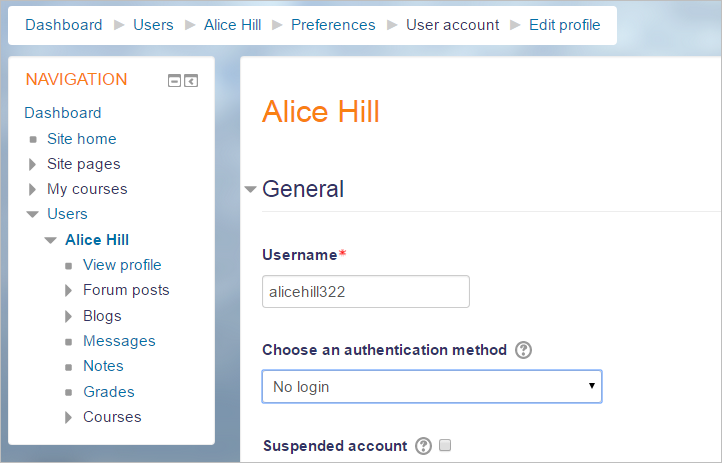No login: Difference between revisions
From MoodleDocs
No edit summary |
Mary Cooch (talk | contribs) (updated screenshot and info) |
||
| (9 intermediate revisions by 7 users not shown) | |||
| Line 1: | Line 1: | ||
{{Authentication}} | |||
An administrator may "turn off" or suspend a user's account by selecting "No Login" in the "Choose an authentication method setting" in the user's profile, or by ticking the 'Suspended account' checkbox. | |||
[[File:newnologin.png]] | |||
[ | Different users have to have unique email addresses in their profile, even when email is not enabled. When the "No Login" setting is used, the account email may not be re-used to create another account. This essentially is a way to bar a particular user account from using Moodle for the duration that the account is assigned to this authentication type. | ||
==See also== | |||
*Using Moodle [http://moodle.org/mod/forum/discuss.php?d=173432 What is the difference between suspending and soft-deleting a user?] forum discussion | |||
[[fr:Pas de connexion]] | [[fr:Pas de connexion]] | ||
[[de:Kein_Login]] | |||
[[es:Sin ingreso]] | |||
Latest revision as of 11:40, 20 July 2015
An administrator may "turn off" or suspend a user's account by selecting "No Login" in the "Choose an authentication method setting" in the user's profile, or by ticking the 'Suspended account' checkbox.
Different users have to have unique email addresses in their profile, even when email is not enabled. When the "No Login" setting is used, the account email may not be re-used to create another account. This essentially is a way to bar a particular user account from using Moodle for the duration that the account is assigned to this authentication type.
See also
- Using Moodle What is the difference between suspending and soft-deleting a user? forum discussion
